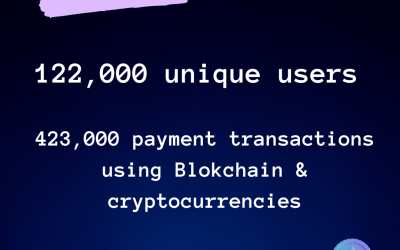
While cryptocurrency is certainly capturing a growing amount of the mainstream’s attention, sluggish and reluctant regulators have prevented it from truly disrupting the payment space. Governments are, however, showing increasing interest in getting the crypto market legislated. The Biden administration recently passed an infrastructure bill requiring crypto exchanges to notify the IRS of crypto transactions – with a view to preventing investors from hiding their gains. This foray into regulating the largely unadministered crypto space is an important step in the legitimization of crypto trading and crypto payment adoption, and seeks to bring cryptocurrencies closer to the financial mainstream.
Regulation Bringing Crypto into the Mainstream
Increased regulation works to protect investors and dis-incentivize cybercriminals, thereby making cryptocurrencies a safer and more legitimate asset and medium of exchange. This will gradually increase the number of use cases, and make crypto payment adoption more viable and profitable for businesses, as well as more practical for consumers. At present, US businesses and investors are operating without clear guidelines on the handling of crypto, which is hampering widespread adoption and the use of cryptocurrency as a payment method for everyday purchases.
Cryptocurrency buy-in is gradually increasing, notably among larger corporations. AMC, for example, now joins other early adopters in accepting online payments in Bitcoin, Bitcoin Cash, Ethereum, and Litecoin. Early adopter merchants are able to participate in setting standards and best practices for this emerging payment space, as well as gaining access to a growing demographic of young, tech-oriented consumers who are increasingly drawn in by mobile-forward purchasing experiences that accommodate digital payments and put convenience at a premium.

Growing Crypto Payment Adoption Among Younger Consumers
With cryptocurrency making its move into the financial mainstream, crypto payment adoption among consumers continues to grow. It represents a significant opportunity for businesses able to incorporate crypto payments into their infrastructure. Crypto adoption is particularly robust among Gen Z consumers at 33%, and Millennials at 35%. Uptake is lower among Gen X (18%) and Baby Boomers (6%), highlighting the popularity of cryptocurrencies amongst younger consumers. However, most (64%) of these participants have simply bought crypto without selling their coins onwards or using them as a payment method, highlighting that consumers still regard crypto largely as an asset. Currently most owners acquire cryptocurrencies to increase their wealth, and this behavior is driven in part by a lack of adoption among businesses and thus few places for crypto holders to spend their coins. This highlights work to be done by crypto exchanges, wallet providers, and business champions on educating consumers on the virtues of using cryptocurrency to make everyday payments. In an increasingly data-sensitive world, consumer privacy is of the utmost importance.
On the consumer side, paying for goods and services with cryptocurrencies gives customers much more control over how their data is used. Merchants can help advocate the privacy benefits to customers to drive adoption and incentivize customers that choose to share their data. Polls have found that crypto non-users generally exclude themselves from the market due to a lack of understanding of blockchain, and complicated processes surrounding purchasing cryptocurrencies. However, at least one in ten non-users at present plans to purchase crypto in the future – with this number likely to continue to grow, representing an ever-increasing segment of the market that early crypto payment adopters are able to capitalize on.
Merchants Can Spearhead Changing Consumer Preferences
The crypto and digital payments space is growing at an increasing rate and represents a new financial frontier for early business champions to take advantage of. New innovations in how consumers are able to pay for goods and services and the growing prevalence of payment options that provide greater flexibility are causing a shift in payment preferences. For example, the growing popularity of “buy now, pay later” networks evidences a greater consumer appetite for convenience and payment flexibility – in 2020, AfterPay reported 13 million users, and Klarna 15 million. The growing presence of alternative and digital-forward payment options is gradually eroding the hold of mainstream payment networks on the consumer payment space – winning over consumers by bringing the customer experience to the forefront.
Many businesses sought to bring cryptocurrency and other digital payments into their network during and post-pandemic to help mitigate the effects of downturns in revenue, expanding their payment offerings to capture wider segments of the market. This saw merchants exploring QR code payment support, digital wallets, and other payment alternatives. In turn, consumers are able to use digital-forward payment options more often as they become more common and easier to use. In this space, merchants are able to drive buy-in from consumers through a value proposition of convenience and flexibility, as well as benefiting merchants directly through lower transaction fees when compared to traditional payment methods (e.g., credit cards) and increased interaction with more cryptocurrency and digital-friendly customers.

Payment Intermediaries for Easy Crypto Payments Incorporation
Merchants considering incorporating alternative payments into their network may be unsure about the best way to do this. Many potential participants in the cryptocurrency space especially are deterred due to a lack of understanding of the market. In this instance, using a payment intermediary is the simplest and most secure way to bring cryptocurrencies into your payment infrastructure. Some of cryptocurrency’s chief draws for many users are the protection of data and transaction privacy, and direct P2P transactions removing the need for a financial middleman. However, using an intermediary or gateway service provides both customers and merchants with a level of security and assurance, as well as a degree of gatekeeping against illicit activities. There is also the added benefit to businesses of payment intermediaries providing pre-made APIs and e-commerce integrations, removing the need for merchants to design and build their own payment interfaces and manage multiple digital wallets. Payment intermediaries will instead hold crypto on behalf of merchants, eliminating the need for merchants to hold crypto in order to accept cryptocurrency payments from customers and the associated volatility risk. In turn, security issues associated with maintaining crypto wallets can also be negated.
Digital payments, and cryptocurrencies notably, are continuing their assault on the financial mainstream with no signs of slowing. An increased interest in regulating the crypto market is likely to expedite the transition of cryptocurrency from asset to viable alternative payment method. Consumers are increasingly buying into businesses that facilitate convenience and flexibility for their customers – with digital payments spearheading this shift in preference. Merchants that can get ahead of the curve for crypto payment adoption are likely to reap the benefits early on of participating in the shaping of payment standards and building a young, passionate and loyal customer base.
RocketFuel’s No Fuss Crypto Checkout Solution
RocketFuel Blockchains crypto payment solutions are designed to empower your business and your customers with flexible and convenient ways to pay for goods and services – we support payment in 120+ cryptocurrencies. Enjoy same-day settlement and receive payment in your preferred fiat currency. Offer your customers enhanced transaction and data privacy, while retaining oversight of payments using our innovative payment dashboards to issue refunds and invoices. Book a meeting today to find out how your business can get ahead of the crypto curve.






Comments are closed.